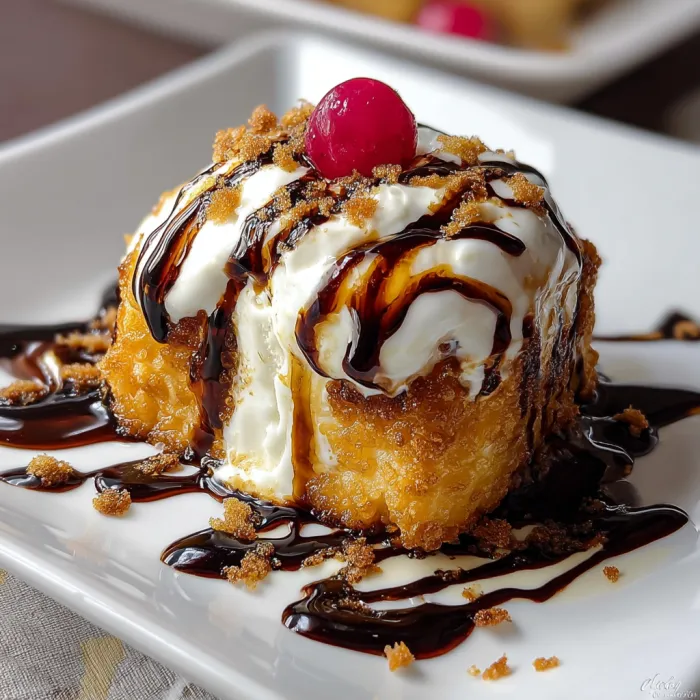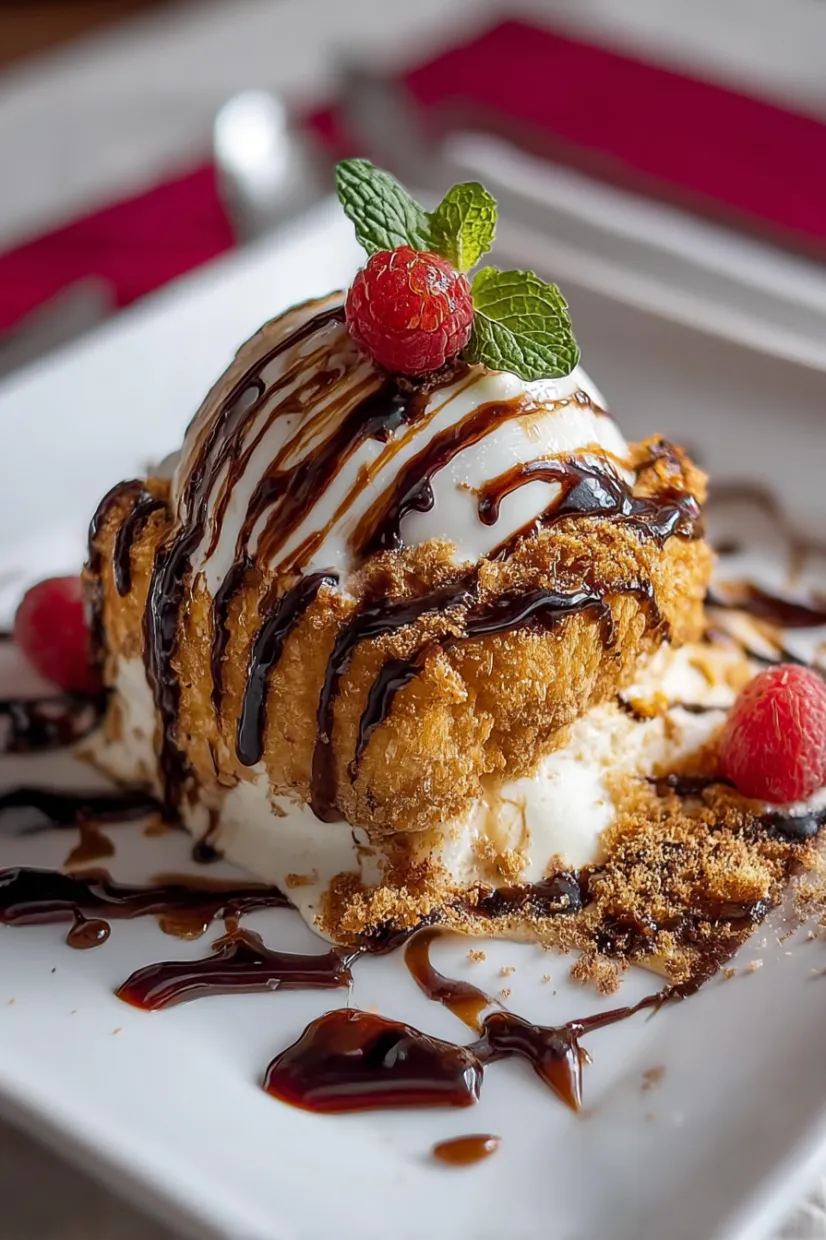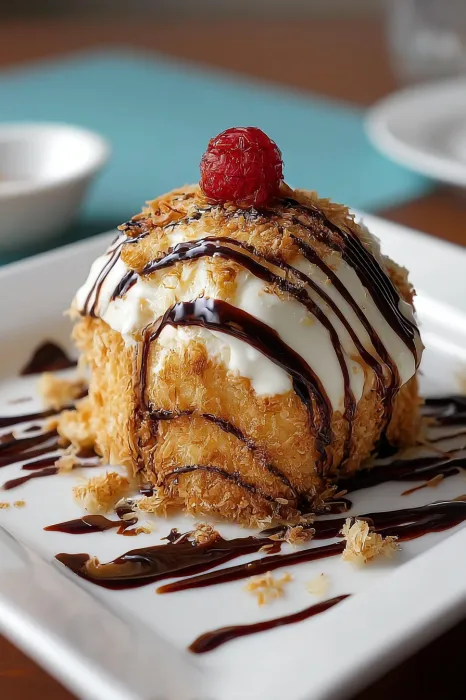 Pin it
Pin it
This crispy fried ice cream dessert brings the magic of fair food right to your kitchen with its contrasting textures of warm, crunchy coating and cold, creamy center. The technique might seem intimidating, but follow these steps for a showstopping dessert that will impress everyone at your table.
I first made this for my daughter's birthday after she tried it at our local Mexican restaurant. The look on her face when she cut into that crispy shell to find perfectly frozen ice cream inside was priceless—now it's our special occasion tradition.
Ingredients
- Vanilla ice cream: Choose a premium brand with high fat content for slower melting
- Cornflakes cereal: Creates the perfect crunchy exterior that holds up to frying
- Ground cinnamon: Adds warmth and complements the cold ice cream beautifully
- Granulated sugar: For sweetness and helps the coating caramelize slightly
- Large eggs: The binding agent that helps the coating stick and creates a barrier
- Milk: Thins the egg mixture for easier coating
- Vegetable oil: Neutral flavor with high smoke point perfect for quick frying
- Whipped cream: Optional but adds a luxurious finish
- Honey or chocolate syrup: Adds sweetness and visual appeal as a drizzle
- Cherries: A classic garnish that adds color and a fruity contrast
Step-by-Step Instructions
- Prepare the ice cream balls:
- Scoop vanilla ice cream into 6-8 uniform balls using an ice cream scoop. Place them on a parchment-lined baking sheet and immediately transfer to the freezer for at least one hour. The ice cream needs to be extremely firm before coating begins.
- Create the cinnamon-sugar coating:
- Combine crushed cornflakes with ground cinnamon and granulated sugar in a shallow bowl. Crush the cornflakes to varied textures for the best coating. Some pieces should be fine while others remain slightly larger for textural interest.
- Prepare the egg wash:
- Whisk eggs and milk together in a separate bowl until completely combined. This mixture creates the crucial barrier that prevents the ice cream from melting too quickly during frying.
- Coat the ice cream:
- Work quickly with one ball at a time while keeping others frozen. First roll the frozen ice cream ball in the cornflake mixture pressing gently to adhere. Next dip in the egg mixture ensuring complete coverage. Finally roll again in cornflakes pressing to create a thick protective coating.
- Freeze thoroughly:
- Return the coated ice cream balls to the freezer for at least 2 hours or preferably overnight. This extended freezing time is crucial for success as it ensures the ice cream is frozen solid enough to withstand the heat of frying.
- Heat the oil:
- Pour vegetable oil to a depth of 2 inches in a deep heavy pot or fryer. Heat to exactly 375°F using a thermometer for accuracy. The precise temperature ensures quick browning without excessive melting.
- Fry the ice cream:
- Lower one ice cream ball at a time into the hot oil using a slotted spoon. Fry for only 10-15 seconds until golden brown watching carefully. Any longer risks melting the ice cream inside.
- Serve immediately:
- Transfer to a paper towel briefly then plate quickly. Top with whipped cream a drizzle of honey or chocolate sauce and a cherry for a classic presentation. Serve within minutes of frying for the perfect temperature contrast.
 Pin it
Pin it
The secret to this recipe is the double coating process. I discovered this technique after several failed attempts where my ice cream melted too quickly. The egg layer between two cornflake layers creates a protective seal that keeps the ice cream frozen even when exposed to hot oil. My family always gathers around the kitchen when frying begins, amazed by the transformation.
Make-Ahead Options
The beauty of fried ice cream lies in its make-ahead convenience. You can prepare the coated ice cream balls up to two days in advance and keep them in the freezer until ready to fry. Store them in an airtight container with parchment paper between layers to prevent sticking. This makes them perfect for entertaining since you only need to heat oil and fry for a few seconds just before serving.
Creative Variations
While traditional fried ice cream uses vanilla ice cream and cinnamon-sugar coating, countless variations await your creativity. Try chocolate or strawberry ice cream for different flavor profiles. Experiment with coating options like crushed cookies, cereal mixtures, or even shredded coconut. Some of my family's favorites include dulce de leche ice cream with a churro-inspired coating and mint chocolate chip with crushed Oreo exterior.
Cultural Context
Fried ice cream has contested origins with both Mexican restaurants and Asian cuisines claiming its invention. The dessert gained popularity in the United States during the 1980s when it became a signature offering at Mexican chain restaurants. The contrast between hot and cold, crunchy and creamy makes it a universally appealing dessert that transcends cultural boundaries. While not authentically Mexican, it has become associated with Mexican-American restaurant cuisine.
 Pin it
Pin it
Frequently Asked Questions
- → How do I prevent the ice cream from melting while frying?
Ensure the ice cream balls are frozen solid by chilling them for at least three hours before frying. Use a slotted spoon to quickly lower and remove them from the hot oil.
- → Can I use a different cereal for coating?
Yes! You can experiment with cereals like crushed graham crackers or rice cereal for unique flavor and texture variations.
- → What oil works best for frying?
Use a neutral oil with a high smoke point, such as vegetable or canola oil, to fry the ice cream balls.
- → Can I make this dessert ahead of time?
Yes, you can prepare and freeze the coated ice cream balls ahead of time. Fry them just before serving for the best texture.
- → What toppings pair well with this dessert?
Top the fried ice cream with whipped cream, honey, chocolate syrup, or cherries for additional flavor and presentation.
